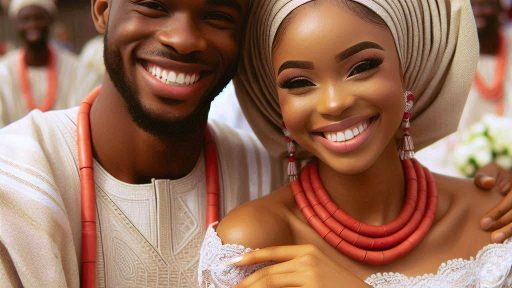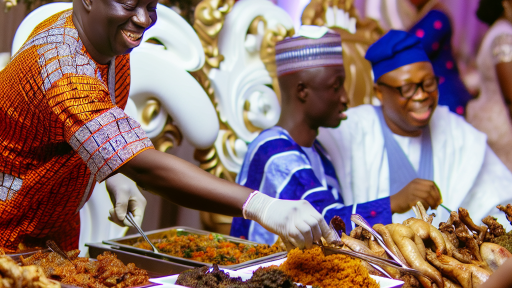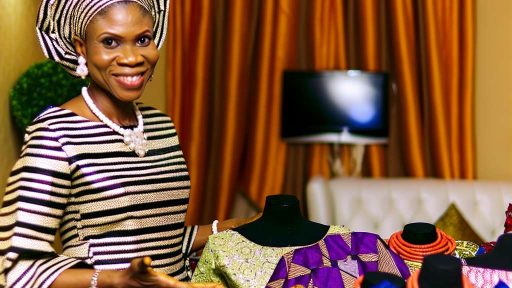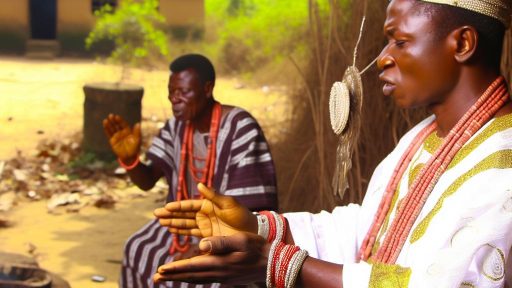Introduction
Unique Yoruba wedding customs stand as a vibrant pillar of Nigeria’s diverse heritage.
Its rich traditions highlight communal unity and familial bonds.
Within this culture, weddings play a pivotal role, symbolizing not just personal unions but also the intertwining of families.
In Yoruba society, weddings are grand celebrations filled with color and joy.
These events often last several days, showcasing traditional values and community involvement.
Families come together to honor the couple and their journey.
This blog post aims to unveil lesser-known customs and traditions associated with Yoruba weddings.
Many people recognize the colorful attire and the lively music.
However, there are unique practices that add depth to these celebrations.
Traditional Attire
Certain Yoruba weddings feature specific attire that reflects the couple’s lineage.
Traditional outfits often include intricate embroidery and bold colors.
The bride may wear a unique gele, showcasing her creativity and style.
Pre-Wedding Rituals
Before the wedding, families might hold a ritual known as “Introduction.”
This event introduces the couple’s families to each other formally.
It emphasizes unity and starts the journey toward marriage.
The Role of Elders
Elders play a crucial role during Yoruba weddings.
They serve as guides and mediators in the marriage process.
Their blessings are essential for a harmonious union and community acceptance.
Gift Exchange
During the wedding, gifts are exchanged between families.
The groom presents items to the bride’s family, symbolizing respect and gratitude.
This act demonstrates the groom’s commitment to his future wife.
Unique Music and Dance
No Yoruba wedding is complete without traditional music and dance.
Specific songs honor the couple’s families and celebrate their union.
Dance performances often engage guests, creating a lively atmosphere.
Yoruba weddings hold a wealth of traditions beyond the surface-level festivities.
Understanding these unique customs enhances appreciation for this vibrant culture.
Each wedding celebrates love, unity, and the richness of Yoruba heritage.
Historical Context of Yoruba Weddings
The origins of traditional Yoruba marriage practices date back centuries.
These customs carry deep significance and reflect the rich cultural heritage of the Yoruba people.
Understanding this context provides insights into the unique elements of Yoruba weddings.
The Origins of Traditional Yoruba Marriage Practices
Yoruba marriage practices have strong ties with the community’s value system.
Here are some foundational aspects:
- Family Involvement: Families play a crucial role in the marriage process.
- Community Blessings: The community’s blessings are vital for a successful union.
- Spiritual Significance: Rituals often carry spiritual undertones, emphasizing the connection to ancestors.
- Negotiation: Traditionally, marriage negotiations involve both families discussing terms.
These practices showcase the community’s embrace of collective responsibilities.
Traditional marriages often showcase respect for cultural heritage.
Rituals reinforce the bond between families, emphasizing unity.
Evolution of Wedding Customs Through Generations
Yoruba wedding customs have evolved significantly over the years.
Here are key changes that highlight this evolution:
- Ritual Adaptation: Some rituals have been modified to suit contemporary values.
- Gender Roles: Modern weddings often challenge traditional gender roles.
- Integration of Western Practices: Many couples now incorporate Western elements into their ceremonies.
- Technology Influence: Social media platforms play a significant role in shaping modern weddings.
This evolution reflects changing societal values and the influence of globalization.
Each generation introduces innovations while maintaining core traditions.
Consequently, the essence of Yoruba weddings remains intact amidst transformation.
Influence of Colonialism and Modernization on Traditional Practices
The impact of colonialism on Yoruba wedding customs has been profound.
Colonial administrators introduced new legal frameworks and cultural norms.
These changes forced many to adapt or modify certain practices.
Here are various influences to consider:
- Legal System: Colonial rule influenced the legal standing of marriages, prioritizing modern registration.
- Religious Interference: Christianity and Islam introduced alternative marriage practices and beliefs.
- Cultural Blending: Interaction with diverse cultures led to blending traditional and modern practices.
- Change in Celebrations: Traditional celebrations often include Western-style receptions, altering traditional norms.
Despite these influences, many Yoruba communities strive to preserve their unique customs.
Efforts to maintain cultural integrity ensure that traditional practices endure.
As a result, younger generations often participate in confirming their heritage through various rituals.
The historical context of Yoruba weddings showcases a rich tapestry of traditions.
From the origins rooted in communal values to their evolution through generations, these customs reflect profound cultural significance.
The influence of colonialism and modernization presents challenges, but the core of Yoruba marriage rituals remains strong.
Understanding the depth of these practices enriches the experience of both participants and observers.
As Yoruba wedding customs continue to evolve, they remain a vibrant testament to the community’s resilience and unity.
Pre-Wedding Rituals
Yoruba weddings are vibrant celebrations filled with rich traditions.
Understanding the pre-wedding rituals brings clarity to their significance.
These customs lay the foundation for the marriage and symbolize respect and unity.
Overview of the “Iwo Umo” or Bride-Price Negotiation
The “Iwo Umo” ceremony holds great importance in Yoruba weddings.
This custom involves the negotiation of the bride-price between the groom’s family and the bride’s family.
Both families gather to discuss this sacred agreement.
- Setting the Date: The bride-price negotiation often occurs weeks before the wedding.
Families choose a suitable date for this important discussion. - Invitation of Family Elders: Both families invite respected elders to mediate the talks.
Their presence adds legitimacy and tradition to the proceedings. - Discussion of the Bride’s Value: The bride’s family shares her value based on her education, character, and cultural background.
This conversation demonstrates the importance of the bride in the community. - Offerings from the Groom’s Family: The groom’s family presents an initial offer.
This sum may vary based on local customs and family stature. - Negotiating Terms: The negotiation process involves back and forth discussions.
Each family presents their stance on the offered price, often with some light-hearted banter. - Documentation of Agreed Terms: Once both sides reach an agreement, they document the terms.
This documentation solidifies the binding nature of the agreement. - Celebration of Agreement: After reaching a mutual understanding, both families celebrate.
This celebration often involves sharing food and laughter, strengthening familial bonds.
The bride-price negotiation symbolizes respect and honor between families.
It sets the tone for a successful marital alliance based on mutual agreement and respect.
It unites both families, creating a network of support for the couple.
Presentation of Kola Nuts and Its Significance
Kola nuts play a significant role in Yoruba wedding customs.
They are often presented during various ceremonies to convey blessings and goodwill.
- Symbol of Hospitality: The presentation of kola nuts signifies hospitality.
It shows that the bride’s family welcomes the groom’s family with open arms. - Spiritual Significance: Kola nuts hold spiritual meaning in Yoruba culture.
Offering the nuts signifies prayers for blessings and prosperity in the couple’s union. - Cultural Essence: The kola nut ceremony is rich in culture.
It reflects the deep-rooted traditions of the Yoruba people and their ancestral heritage. - Ritual of Breaking: During the ceremony, the kola nuts are broken in a specific manner.
The eldest family member usually initiates this; it symbolizes unity and shared joy. - Offering to Ancestors: Kola nuts are also offered to ancestors.
This offering reinforces the connection between the living and their forebears. - Colorful Presentation: Traditionally, kola nuts are presented in colorful wrappers.
This practice adds a festive and joyful touch to the ceremony. - Unity and Peace: The sharing of kola nuts among families signifies a wish for unity and peace in the upcoming marriage.
Through the presentation of kola nuts, families share blessings and affirm their commitment to nurturing the marriage.
This tradition showcases the Yoruba people’s appreciation for hospitality and respect in relationships.
The Role of Family Dynamics in Pre-Wedding Ceremonies
Family dynamics significantly influence Yoruba pre-wedding customs.
The interplay of relationships shapes how ceremonies unfold, adding depth to their meanings.
- Inclusion of Extended Family: The presence of extended family is crucial.
It provides a sense of belonging and support to the couple. - Input from Elders: Elders play a pivotal role in advising families.
Their wisdom helps guide decisions and maintain respect for traditions. - Preparations by Family: Families actively participate in preparing for the ceremonies.
This involvement showcases their investment in the couple’s future. - Celebration of In-Laws: The negotiation processes often include acknowledging the groom’s family.
This recognition emphasizes the importance of both families’ contributions to the union. - Conflict Resolution: Family dynamics can also influence conflict resolution.
Open communication helps manage disagreements effectively during ceremonies. - Community Involvement: Family collaboration extends to community members.
Their participation reinforces cultural identity and showcases communal support. - Strengthening Relationships: The rituals facilitate stronger bonds between families.
Over time, they foster lasting connections among relatives.
The dynamics of family relationships imbue pre-wedding rituals with meaning.
These customs nurture connections and ensure families support the couple’s journey ahead.
Together, families create a foundation of love and unity essential for the marriage.
In fact, pre-wedding rituals in Yoruba weddings illustrate a beautiful mix of tradition and family values.
Understanding the nuances of the “Iwo Umo,” the significance of kola nuts, and the role of family dynamics enriches the appreciation of Yoruba culture.
Each custom contributes uniquely to the overall celebration of love, respect, and commitment.
Read: Discover How Igbo Traditional Weddings Influence Modern Marriage Practices
The Engagement Ceremony (Lafun Owo)
The engagement ceremony, known as Lafun Owo, is a vibrant and meaningful event.
It marks the official union between the bride and groom’s families.
Traditionally, this ceremony serves as a prelude to the wedding and involves several rituals and rites.
Description of the Engagement Ceremony and Its Rituals
During Lafun Owo, the families come together to celebrate the couple’s union.
The ceremony usually occurs at the bride’s family home.
An essential part of this event is the formal introduction of both families.
A unique aspect of Lafun Owo is the negotiation process between both families.
The groom’s family arrives with gifts and presents for the bride’s family.
This symbolizes respect and the seriousness of their intentions.
Upon arrival, the groom’s family formally introduces themselves.
They express their desire to take the bride as their son’s wife.
The bride’s family listens attentively, often responding with friendly banter and negotiations.
The ceremony includes traditional songs and dances.
These performances create a joyous atmosphere and represent the cultural heritage of the Yoruba people.
It often turns into a festive gathering with food and festivities.
One of the significant rituals is the presentation of the engagement list.
This list details items the groom’s family must provide.
Common items include cash, foodstuffs, clothing, and other significant gifts.
The bride then comes forward, adorned in traditional attire.
A key moment occurs when she publicly expresses her acceptance of the groom.
This moment signifies her commitment to the union.
Finally, elders from both families officiate the ceremony.
They bless the couple and encourage their commitment to one another.
This moment is sacred and highlights the importance of family support in marriage.
Key Participants and Their Roles during the Engagement
Several key figures participate in the engagement ceremony.
Each person has a unique role that contributes to the event’s success.
- The Bride: She is the focal point of the ceremony, representing love and commitment.
- The Groom: He symbolizes strength and readiness to start a family.
- Parents of the Bride: They oversee the ceremony and indicate the family’s acceptance of the groom.
- Parents of the Groom: They present gifts and negotiate with the bride’s family.
- Elders: Respected figures who officiate the ceremony and offer blessings.
- Friends and Family: Their presence helps create a supportive atmosphere during the engagement.
Each participant plays a vital role in ensuring the ceremony is meaningful.
Their contributions reflect the collective effort in bringing the couple together.
Significance of Traditional Attire and Colors Worn
Traditional attire plays a crucial role during Lafun Owo.
Both the bride and groom wear clothing that reflects their cultural heritage.
The bride typically wears an elaborate lace or adire dress.
Her attire often features vibrant colors and intricate designs.
She may accessorize with gele, a traditional head tie, adding elegance and cultural significance.
The groom often wears a traditional agbada or buba and sokoto set.
His outfit may feature patterns that symbolize his family’s lineage or personal style.
Typically, the colors blend harmoniously with the bride’s attire.
The choice of colors in the engagement attire carries deep meaning.
Each color has cultural implications that reflect emotions and intentions.
For instance, red symbolizes love, while gold represents wealth and prosperity.
Guests also participate by dressing in traditional attires.
Their clothing demonstrates respect for the couple and their families.
This collective display of culture enhances the celebratory atmosphere.
Overall, the engagement ceremony embodies the rich customs of the Yoruba people.
It emphasizes unity, respect, and commitment between families.
Each ritual carries significance, creating a memorable experience for everyone involved.
As couples prepare for this ceremony, understanding its depth and rituals is essential.
Embracing these customs enriches the wedding experience and strengthens familial bonds.
Lafun Owo is not just an event; it’s a celebration of love, tradition, and community.
Read: Exploring Nigeria’s Unique Traditional Wedding Rituals
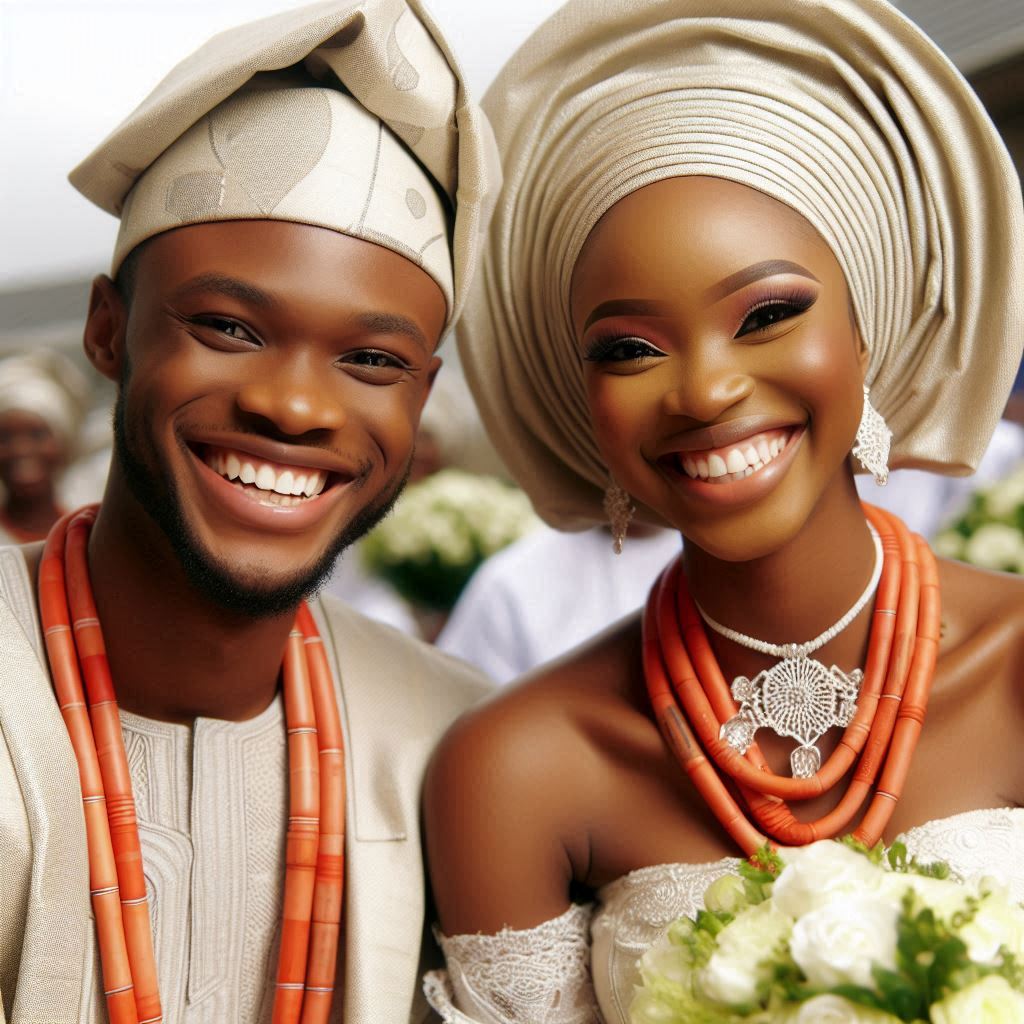
Traditional Wedding Attire and Accessories
Traditional Wedding Attire for Both Bride and Groom
Yoruba wedding attire carries deep cultural significance, reflecting the rich heritage and traditions of the Yoruba people.
Each outfit reflects the rich heritage of the Yoruba people.
The bride’s attire is typically vibrant and adorned with elaborate patterns.
The groom often wears a traditional outfit called ‘agbada’ or ‘buba and sokoto.’
Both outfits are tailored to showcase elegance and tradition.
The bride often wears a ‘buba’ (blouse) and ‘iro’ (wrapper), complemented by a ‘gele’ (headwrap).
These elements combine to create a striking appearance that honors her lineage.
Grooms often opt for a more understated look but equally stylish.
The combinations of agbada with intricate embroidery demonstrate the status and style of the groom.
Additionally, the choice of fabrics varies.
Commonly used fabrics include Aso Oke, lace, and Ankara.
Each fabric choice conveys different meanings within the Yoruba culture.
Significance of Specific Colors and Patterns
The colors chosen for wedding attire hold significant meanings.
Bright colors symbolize joy, happiness, and celebration.
Typical colors include gold, blue, and rich earth tones.
- Gold: Represents wealth and prosperity.
- Blue: Symbolizes tranquility and stability.
- Red: Signifies love and passion.
- Green: Stands for fertility and growth.
Patterns also vary significantly and carry meanings.
Stripes, geometric designs, and floral patterns frequently appear in wedding attire.
Each pattern choice can denote different family backgrounds and clan affiliations.
Consequently, the fabrics and designs often resonate with the couple’s lineage.
Discussion of Accessories
Accessories play a crucial role in completing the traditional Yoruba wedding attire.
One of the most recognized accessories is the ‘gele.’
This headwrap is not merely decorative; it has deep cultural roots.
Worn by brides and female guests, the gele comes in various styles and sizes.
The way a gele is tied can reflect the wearer’s status and personality.
Another prominent accessory includes the ‘ibeji,’ a representation of twins.
The Yoruba culture places great significance on twins, often viewed as symbols of good fortune.
Couples may choose to incorporate ibeji motifs into their attire or accessories.
The ibeji connection symbolizes their commitment to balance and harmony in their marriage.
Additionally, brides adorn themselves with intricate jewelry.
This includes traditional pieces like necklaces, earrings, and the ‘oruka’ (wedding ring).
Jewelry choices often reflect personal and family histories.
Moreover, grooms typically wear caps called ‘fela’ or ‘alu,’ which further signify their cultural heritage.
These caps complete their overall look and connect them to tradition.
Symbolism Behind the Attire and Accessories
The traditional wedding attire and accessories are laden with symbolism.
Each color, pattern, and accessory conveys deeper meanings relevant to Yoruba culture.
For instance, the vibrant colors reflect the happiness of the occasion.
They signal the couple’s joy and the community’s collective celebration of their union.
Patterns often commemorate ancestral history.
They remind attendees of the lineage and the importance of cultural heritage.
The gele not only serves a fashion purpose but also signifies respect.
It shows the bride’s connection to her family and culture.
Additionally, jewelry serves practical and symbolic roles.
It represents beauty, wealth, and self-expression within the context of marriage.
Understanding the traditional Yoruba wedding attire and accessories provides insight into cultural richness.
Each element, from vibrant colors to intricate patterns, tells a story worth knowing.
Brides and grooms not only celebrate their love but also their heritage.
The carefully chosen attire connects them with their ancestors and community.
The symbolism within every design choice enhances the wedding experience and reinforces cultural pride.
Ultimately, Yoruba weddings offer a vibrant glimpse into a rich, enduring tradition.
Read: Essential Nigerian Wedding Planning Tips for A Perfect Ceremony
Unique Yoruba Wedding Customs
The Yoruba culture is rich with traditions and customs, especially when it comes to weddings.
Each ceremony has unique rites that embody the cultural heritage of the Yoruba people.
Some customs may be well-known, while others remain hidden gems of the tradition.
Here are some of these fascinating elements that truly set Yoruba weddings apart.
The Ritual of “Fifin”
The “Fifin” ceremony is a significant part of Yoruba weddings.
During this ritual, the bride and groom seek blessings from their elders.
This part of the wedding is deeply rooted in respect for elders and acknowledgment of their wisdom.
- Seeking Blessings: The couple approaches their elders and kneels before them.
This act demonstrates humility and reverence. - Words of Advice: Elders often share invaluable advice alongside their blessings.
These words encompass life lessons and marital guidance. - Symbolic Gesture: The kneeling position signifies the couple’s submission to the family structure and tradition.
They acknowledge that marriage is not just a union of two individuals but also of two families. - Unity of Families: This ritual emphasizes the importance of family in Yoruba culture.
It strengthens bonds between both families. - Connection to Ancestors: Blessings from elders connect the couple to their heritage.
It reflects the collective support of ancestors during their marital journey.
The “Fifin” ceremony represents a profound moment during the wedding.
It highlights the importance of family and community, establishing a solid foundation for the couple’s union.
Their ties to their heritage and loved ones become palpable during this auspicious occasion.
The Dance of the Couple
Dance plays a crucial role in Yoruba weddings, uniquely expressing emotions and cultural identity.
The couple’s dance, often referred to as the “Ireke” dance, is symbolic in many ways.
- Symbolism of Unity: The couple dances together to symbolize their unity.
Their synchronized movements illustrate their commitment to each other. - Celebration of Joy: The dance reflects the joy of their union.
It invites guests to join in the celebration, increasing the communal spirit. - Cultural Expression: The dance incorporates traditional music and attire.
It showcases Yoruba heritage through rhythm and movement. - Journey of Life: The couple often expresses various stages of their relationship through the dance.
This portrayal signifies their journey together. - Imitation of Deities: Their movements may imitate those of deities or other significant figures, linking the couple to the spiritual world.
The couple’s dance is not merely entertainment; it carries deep meaning.
It serves as a reminder of the important role of love, community, and shared heritage in their new life.
Symbolic Acts: Breaking the Calabash
One of the most striking Yoruba wedding customs involves breaking a calabash.
This act is symbolic and rich in meaning.
- Calabash Significance: The calabash is a traditional container, often used in various cultural contexts.
It stands for nourishment, wealth, and family. - Breaking for Prosperity: When the calabash is broken, the guests often shout blessings.
This act symbolizes the expectation of abundance in the couple’s life. - Dispelling Evil: Breaking the calabash also serves to ward off negative energies.
It symbolizes the couple’s intention to ward off any ill fortune. - Unison of Families: As the calabash shatters, it represents the coming together of two families.
The pieces symbolize the merging of lives and traditions. - Invoking Spirits: The action also seeks to invoke spiritual approval for the union.
It aligns with Yoruba beliefs in the supernatural’s role in marital success.
The act of breaking the calabash resonates deeply within Yoruba culture.
It encapsulates hopes for prosperity, protection, and unity as couples embark on their matrimonial journey.
Yoruba weddings showcase a captivating blend of rituals that signify love, respect, and the intertwining of lives.
The “Fifin” ceremony emphasizes respect for elders and the importance of family.
The couple’s dance expresses shared joy and the spiritual connection they maintain through tradition.
Breaking the calabash further highlights aspirations for prosperity and unity.
These unique customs offer insight into the vibrant world of Yoruba culture.
Each tradition enhances the wedding ceremony, weaving a tapestry that celebrates not just the couple but their lineage and community.
As weddings evolve and new customs emerge, these timeless practices remain vital in preserving cultural identity.
Couples can find richer meanings in their marital journey while embracing the significance of their heritage.
Read: Cultural Celebrations: Integrating Nigerian Traditions in US Weddings
Post-Wedding Celebrations and Rituals
Yoruba weddings extend far beyond the ceremony.
They include vibrant post-wedding celebrations.
One of the significant rituals is the “Owo Iya” ceremony.
This involves the bride’s family and marks the couple’s new journey together.
Overview of the “Owo Iya” Ceremony
The “Owo Iya” ceremony occurs shortly after the wedding.
This ceremony serves as a formal acknowledgment of the bride’s family.
It demonstrates the groom’s respect for his bride’s parents.
During this ceremony, the groom presents gifts to the bride’s family.
These gifts often include money, clothing, and various items.
The family sees this gesture as an essential part of honoring their daughter.
The ceremony typically occurs at the bride’s family home.
Traditionally, the bride’s mother plays a vital role in this event.
She receives the gifts and offers blessings to the couple.
The significance of “Owo Iya” extends beyond mere material offerings.
It symbolizes the merging of two families.
This ceremony helps solidify relationships between the groom’s and bride’s families.
Importance of Thanksgiving Ceremonies to Ancestors
Thanksgiving ceremonies are another integral part of Yoruba post-wedding celebrations.
These ceremonies serve as a form of appreciation towards ancestors.
Yoruba culture places immense value on respecting one’s roots.
After the couple’s union, they hold a thanksgiving ceremony to celebrate their marriage.
During this ritual, they thank their ancestors for guidance and support.
Family members and friends gather to partake in this sacred event.
The thanksgiving ceremony often features prayers, songs, and blessings.
Family members share memories and express gratitude.
This sharing of stories helps foster a sense of community and belonging.
Additionally, offering tributes to ancestors reinforces cultural heritage.
Couples maintain a connection to their lineage, emphasizing the importance of family ties.
The ceremony usually includes a feast prepared by both families.
Traditional dishes symbolize abundance, love, and unity.
Guests are often treated to a variety of local dishes, enhancing the festive atmosphere.
Community Involvement in Celebrations
Yoruba post-wedding celebrations strongly emphasize community involvement.
Friends, family, and even neighbors join in the festivities.
This communal aspect of Yoruba culture highlights the sense of belonging to a larger family.
During the celebrations, the community participates in various activities.
These activities include singing, dancing, and storytelling.
Music and dance play crucial roles in conveying emotions and joy.
Traditional drumming and music create a vibrant atmosphere.
The rhythmic beats invite everyone to dance and celebrate together.
This participation fosters unity among families and friends.
In addition to music and dance, community members often contribute to the couple’s needs.
They may help decorate the venue or prepare meals.
This involvement strengthens community bonds and illustrates the Yoruba concept of “it takes a village.”
Also, community blessings during the celebrations are essential.
Elders impart wisdom, sharing advice and well-wishes for the couple’s journey.
The couple receives these blessings with gratitude and reverence.
The Role of Music and Dance in Celebrations
Music and dance bring a unique vibrancy to Yoruba post-wedding celebrations.
They serve as expressions of joy, unity, and culture.
Various traditional instruments add flavor to the festivities.
Mauricious drums, gongs, and flutes often accompany wedding celebratory songs.
These instruments enhance the atmosphere and create an engaging vibe.
The energetic rhythm encourages participation from everyone present.
Traditional songs often convey messages of love, blessings, and unity.
They reflect the couple’s journey and hopes for the future.
Guests typically join in singing, creating a communal experience.
Dance is equally important during these celebrations.
Different styles and movements reflect cultural significance and stories.
Couples often join their guests in dancing, symbolizing their connection to their community.
Many dances incorporate storytelling through movement.
Dancers express emotions and share tales through their gestures.
This artistic expression aligns with the Yoruba belief in the power of storytelling.
The combination of music and dance creates an atmosphere of joy and celebration.
It strengthens relationships among families and friends.
Such communal celebrations enhance the couple’s support network.
After the ceremony, music and dance often continue into the night.
This joyous celebration reinforces memories that last a lifetime.
Ultimately, these rituals showcase the richness of Yoruba culture and its emphasis on community.
Contemporary Influences on Yoruba Weddings
As time passes, the landscape of Yoruba weddings continues to evolve.
Modernization has influenced many traditional practices.
While some couples hold tight to tradition, others embrace contemporary elements.
This blending of old and new creates a dynamic and unique wedding experience.
How Modernization is Changing Traditional Practices
Modern Yoruba weddings now reflect changing societal norms and lifestyle shifts.
This transformation manifests in several ways:
- Wedding Venues: Traditionally, ceremonies took place in family homes or community centers.
Now, many couples opt for lavish venues that cater to large guest lists. - Dress Code: Couples increasingly wear attire that showcases their personal style, often going beyond traditional Yoruba garb.
Designers infuse modern aesthetics into conventional fabrics. - Guest Participation: Modern weddings sometimes prioritize guest comfort and involvement.
Interactive elements like photo booths and signature cocktails become popular. - Technology: Many couples use live streaming to share their ceremonies with friends and family worldwide.
Social media also plays a significant role in the wedding experience. - Planning: Couples often hire wedding planners who understand both traditional and contemporary aspects.
This allows for a seamlessly blended wedding experience.
Incorporation of Western Elements into Yoruba Weddings
Many Yoruba couples today subtly integrate Western customs into their ceremonies.
This blend can enrich the wedding’s atmosphere.
Here are some common adaptations:
- Ceremony Structure: Western ceremonies often include the exchange of vows.
Some Yoruba couples choose to adopt this tradition, adding a personal touch to their weddings. - Cocktail Receptions: Instead of sticking to traditional feasting, many couples incorporate cocktail receptions.
This invites a more casual and social atmosphere. - First Dance: The first dance is a staple in Western weddings.
Yoruba couples now include this moment, fostering an emotional connection. - Wedding Favors: Giving guests personalized favors has become trendy.
Couples select items that reflect their personalities rather than traditional gifts. - Photographic Styles: Wedding photography has shifted with modern styles.
Couples now favor candid shots over posed images, emphasizing natural moments.
The Balance Between Tradition and Contemporary Styles
While modernization encourages change, many Yoruba couples strive for a harmonious balance.
They honor their heritage while embracing new trends:
- Combining Attires: Couples often blend traditional and modern outfits.
The groom may wear a Western suit for part of the event, then switch to traditional attire. - Music Choices: While traditional Yoruba music remains important, many couples also include Western genres.
This caters to diverse guest preferences and keeps the atmosphere lively. - Ceremony Programs: A mix of Yoruba rituals and Western elements highlights the balance.
Couples might incorporate prayers and blessings alongside Western readings. - Food Diversity: Weddings now feature an array of cuisines.
Traditional Yoruba dishes coexist with international fare, appealing to all guests. - Guest Experience: Many couples prioritize guest engagement, blending interactive modern features with rich tradition.
This creates a festive and celebratory atmosphere.
In general, the evolution of Yoruba weddings reflects broader societal changes.
Couples increasingly blend traditional practices with modern influences.
They maintain a deep respect for their cultural heritage while inviting contemporary elements into their wedding celebrations.
Ultimately, this fusion creates a richer and more memorable experience.
Each wedding becomes an expression of the couple’s unique story and identity.
The thoughtful integration of past customs with modern trends ensures that Yoruba weddings remain vibrant and relevant.
Conclusion
The Yoruba wedding customs create a vibrant tapestry of culture and tradition.
Through our exploration, we highlighted various unique practices.
These traditions showcase the rich heritage of the Yoruba people and their value for love and community.
From the colorful engagement events to the significance of traditional attire, each element plays a vital role.
Preserving these customs is essential in an ever-evolving world.
As modern influences blend with traditional values, maintaining these practices helps keep cultural identity alive.
This ensures that future generations understand their roots and heritage.
It also fosters a sense of belonging and continuity, essential for cultural transmission.
As you reflect on these customs, consider your own experiences.
Have you encountered unique Yoruba wedding traditions?
Perhaps you have participated in a ceremony that showcased these vibrant practices.
Sharing stories enhances our understanding and appreciation of cultural diversity.
We invite you to engage with us. Your insights and personal experiences matter.
Let’s celebrate the beauty of Yoruba wedding customs together.
In closing, remember that every wedding tells a story.
Each ceremony honors love, family, and tradition.
By sharing and preserving these stories, we contribute to the rich legacy of the Yoruba culture.

